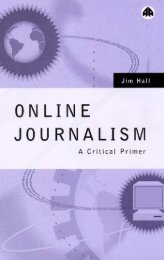Modul Mata Kuliah Journalisme Online - Ayo Menulis FISIP UAJY
Modul Mata Kuliah Journalisme Online - Ayo Menulis FISIP UAJY
Modul Mata Kuliah Journalisme Online - Ayo Menulis FISIP UAJY
Create successful ePaper yourself
Turn your PDF publications into a flip-book with our unique Google optimized e-Paper software.
perpetual evolution of technology, form and economics -- ever blessed by the protections of the First<br />
Amendment. Now, as the Age of the Internet dawns, posing ever greater opportunities for information<br />
providers and consumers alike, it is essential for credible journalists and their organizations to reflect on<br />
the contract that is implicit in the First Amendment. In its highest form, journalism is the dissemination<br />
of accurate information and provocative commentary that puts service to the reader and the common<br />
good above any special interest or economic, political or philosophical agenda. What other form would<br />
be so worthy of such First Amendment protection? Spirited independence gives credibility to journalists<br />
and their organizations in any era; such credibility will likely give journalism its enduring value in society<br />
-- and in the marketplace. As new forms of storytelling emerge, new technologies move to newsroom<br />
desktops and new efficiencies promise to change the dynamics between information providers and<br />
consumers, the line between news and opinion can easily be blurred -- imperiling the credibility of the<br />
practitioners and their organizations. Especially as they explore and expand their Web-based services,<br />
credible journalists and their organizations must maintain a heightened sensitivity to the various and<br />
vital forms of their craft, and articulate the distinctions in actual practice. The issues of news,<br />
commentary, voice and tone -- issues that have always been of concern in newsrooms -- can best be<br />
resolved and addressed through the time-tested journalistic imperatives of accuracy, fairness and<br />
independence.<br />
Principles & Values<br />
Journalists should honor the principle of independence. They should avoid conflicts of interest<br />
or the appearance of conflicts that could imperil their ability to report or the credibility of their<br />
reporting or commentary. They should not accept gifts or favors from people or entities they<br />
cover or over whom they might influence coverage.<br />
In addressing an issue or question of independence, the resolution might come through a<br />
strategy of transparency or disclosure.<br />
Journalists and news organizations should understand the necessity of defining, and clearly<br />
labeling, news and opinion. In an open environment like the Web, consistency in presentation<br />
can help the reader see clearly where the lines are drawn between news and opinion.<br />
Whenever journalists or organizations blur or blend those roles, they need to recognize the peril<br />
and weigh the consequences.<br />
Variations of tone and presentation in storytelling are appropriate for reaching new audiences,<br />
but those variations should be consistent with the bedrock editorial principles of the brand. Be<br />
clear on what you stand for, and honor it.<br />
These principles apply across all content and all platforms.<br />
Protocols<br />
Even with firm principles, journalists and organizations will always face difficult decisions. But the<br />
principles can lead to some guidelines -- not rules -- that can serve the decision-making. Open-ended<br />
questions produce informed discussion and good decisions. Here are some questions that can help with<br />
the decision-making on commentary, reporting, voice and tone.<br />
What is this journalist's primary role?
















